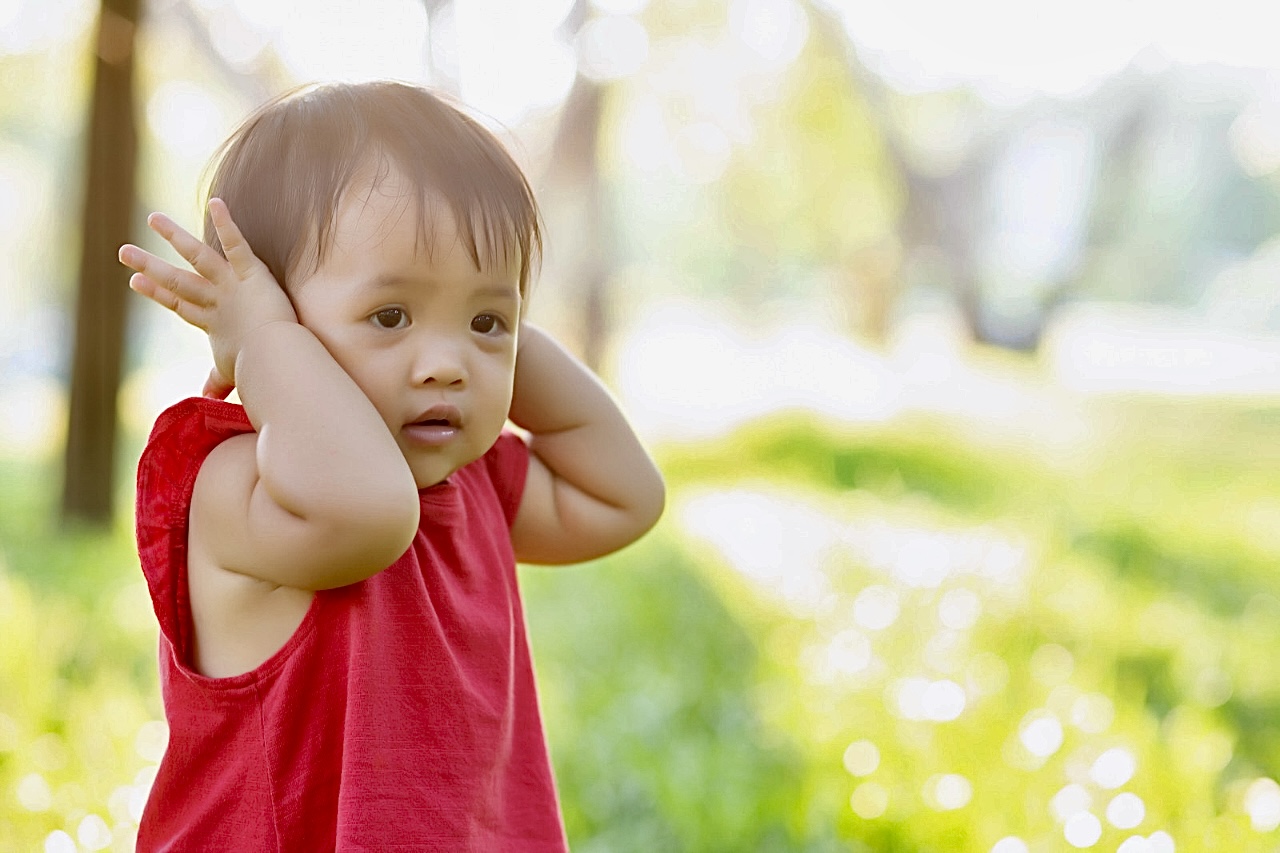Question: Do you have sensory sensitivities? What kind of sensory sensitivities do you have? How do you cope with them?
Preeti Dixit: I have severe sound and touch sensitivity. I can’t stand loud sounds. Loudspeakers and firecrackers are a nightmare for me. I have to wear soundproofing ear plugs and earphones to protect myself from their sounds. I’m bothered by sounds of everyday living (washing machine, mixer, cooker, vacuum cleaner, maid washing vessels, clock ticking, vehicles honking, traffic passing by, construction work) to the point of distraction and to the point of distress if there are too many sounds at once or sounds for a stretch of time. I put cotton balls in my ears when the sounds start bothering me day or night.
For touch sensitivity, I have to always wear loose, breathable cotton clothes. I can’t stand the feel of synthetic materials, polyester, silk, wool, zari. I can’t wear tight-fitting clothes AT ALL. I can’t wear makeup or jewellery. I can’t wear fancy footwear. I have to wear comfortable shoes or slip ons made of fabric or soft leather. No hard leather.
I also can’t stand the smell of perfume. It gives me an instant headache. And I can’t stand bright flashing lights, especially fluorescent ones.
The only way I have found to cope with my sensory sensitivities is by protecting myself from sensory stimuli that I find distressing. I try to avoid or at least limit my exposure to such stimuli because no amount of repeated exposure makes it easier to bear. In fact, it makes it harder.
Samriddhi Malhotra: I have major touch sensitivity. I prefer clothes that don’t touch my body at all. I stopped wearing jeans a few years ago and it changed my life. When it comes to sound, I have hyposensitivity. So sometimes I don’t even notice sounds that are loud and bothering other people. It’s the same with pain. I generally don’t notice or recognize pain in my body until it gets really unmanageable. However, when it comes to crowded places, like at an airport or metro, the sensory experience can be very overwhelming for me. I feel much better when I use my noise-cancelling headphones.
Sweta Sukhani: Sensory sensitivity is the one thing that rules my life every single day. I am kind of particular about how much light I want at different times of the day. Too bright starts overloading me, too dim makes me uneasy.
Complex noises like multiple people talking over each other, too many phones, too many notification sounds, can create complete havoc and send me into a shutdown.
Taste and food sensitivity is very high for me. At any given time, I can only eat what I want to eat and I can’t rest till I have eaten it (it sounds extreme but I manage somehow). I can’t eat the same foods either. It’s very mood-dependent. Most of my meltdowns are because I haven’t eaten for very long because I have not been able to decide what to eat for hours.
Touch sensitivity – any touch not initiated by me is torture, I remember the touch where a person came from behind me and casually kept their hands on my shoulder for days. Even regular touch feels like it leaves imprints on my body. It is much better when I initiate the hug. Tactile defensiveness is another issue. I have screamed at people (mostly coz of how much pain it causes me) for their poking or startling touches or any kind of tickling or pinching – nightmare! And the sensation lasts for hours, if not days! I also get tickled and laugh uncontrollably if someone just waves their hands in the air and does the action… that sensitive.
Navi A: I have very high sound sensitivity. I keep:
- 3M Optimes (industrial sound blocking earmuffs).
- 3M foam earplugs, my preferred choice during the day.
- Airpods, good to wear under the Optimes if I’m heading out in traffic.
- Flare, doesn’t reduce sound volume but cuts out high pitched noises significantly. I use these when I want to talk as well as block sounds since everything else makes my voice too loud in my ears to speak.
- Loop, good to shower when the cars are honking too much to do it. These are waterproof. Only Flare and Loop are waterproof.
I can’t take a shower whenever I want because I have to leave my ears open for it. My house is at an intersection so car horns are there at almost 10 second intervals. This means I can only attempt a shower post 10 pm.
It’s a big task to find clothes I can sleep in (because of tactile sensitivity). I have washed and worn a wet t-shirt until it dried (ironing can ruin the texture) in the night before I can sleep because without it I’d be waking up every 1-2 hours. Day clothes I have less sensitivity to but still enough that I can’t wear just anything.
There’s often blinking white lights on top of buildings these days and some of them are left on 24/7 so I can’t look out my room’s windows at any hour (because of visual sensitivity). They regularly hurt me at night. Any kind of white light makes a space inaccessible to me. I no longer shop at grocery stores that have this, relying on home delivery instead. There’s some great gardens which have installed white lights meaning I can’t go there when they’re turned on. It would give me the most persistent kind of headache, lasting 2-4 hours often forcing me into a shutdown asleep for that time. Conversely in foreign countries some spaces not only have only yellow lights but diffuse ones, that aren’t bright and a lot of them spread around an area. Providing even light that’s not too bright in any areas at all. They do this specifically to make spaces accessible to autistic people and it looks amazing.
Follow-up question: Wouldn’t exposing a child to sounds reduce sound sensitivity over a period of time?
Navi A: I’ve lived in Mumbai for 35 years and it hasn’t helped any so… There are also autistic elders who even though reporting age related hearing loss in general, are still sensitive to sounds they can hear. Besides, a large part of the pain from sound is from my focus being jerked.
So imagine you’re just standing and someone grabs your shoulders and shakes you. It’s annoying but meh. Now imagine that you’re trying to talk as that happens. It’s much more annoying isn’t it? It’s the same but with much more focus and much pain rather than discomfort.
Sounds jerk my attention, make it impossible to continue thoughts or speaking. I can force myself to ignore this but it comes at a heavy cost and I only do it when absolutely no other alternatives are possible.
I can’t imagine this ever changing. It will always be annoying to be focus jerked. This is why unexpected sounds are worse than expected ones. If I brace myself for it, it hurts maybe 60% less. 60% less means it no longer hurts worse than an electric shock from a hot water geyser, but merely a punch. I mean this as a literal comparison. I’ve gotten shocked by the geyser accidentally and am comparing the pain.
Preeti Dixit: I try to expose myself to the sounds of daily living as much as possible. I can bear them for a certain amount of time but not beyond that. How much time I can bear them depends on other factors/stresses. The more the number of stressors, the lesser my tolerance. Sometimes, the sound of the mixer will cause me so much distress that I have a meltdown. No amount of listening to sound of the mixer has reduced my sensitivity to the sound. If I have to listen to the sound off the mixer more, I will probably have an all out, out of control meltdown.
Spriha Modi: I’d like to add that research on autism and exposure therapy has clearly laid out that exposing an autistic child/person to sensory stimuli does NOT make them more able to tolerate them. What happens though is over time, because the sensory stimuli are repeatedly present, the autistic child/person becomes more shut out or shut down as a way of protecting themselves. This can lead to the person becoming disconnected with those around them or the situation around them. For skills, yes, exposure helps and practice helps. For sensory stimuli, please do not forcibly expose your autistic child in the hope that they will be better able to tolerate it.
Aditi Gangrade: I was born and brought up in a joint family. Our house was the loudest one in our society. Enjoyment meant being loud for most members in my family. That never helped. I got angry too often and too soon. My meltdowns were considered my teen emotions. Even family functions like weddings, parties, and get-togethers were traumatic because every celebration had dholak or some loud musical instrument playing, people talking too loudly, or someone hooting. Constant exposure to loud and unexpected sounds only meant worsening mental health. My immediate family understands my sound sensitivity now and they accommodate me by either avoiding loud spaces or giving me a quiet space to self-regulate. And, trust me, I’m in a much better place now mental health wise.








